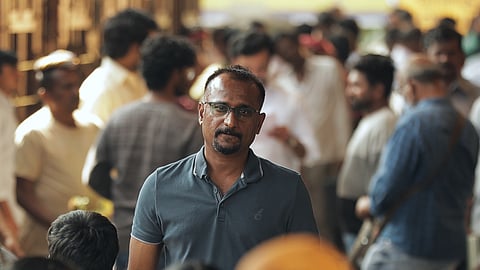

When I used it to describe him, Deva Katta does not wear the word maverick easily. “I don’t know if I deserve that compliment yet,” he says, with a half-smile. “Maybe someday I’ll live up to it,” he adds. Mayasabha, his sprawling political web series streaming on SonyLiv, has been a runaway success.
The director says that the numbers are staggering, 10 million views officially, with piracy multiplying that reach several times over. “We thought this would be something urban, for the 25-plus demographic,” he admits and adds, “But I was shocked to see how even the 20-year-olds were hooked. There’s a curiosity that drives them, even though I kept saying it’s pure fiction, people still wanted to believe it was real.”
That curiosity, he believes, is the lifeblood of storytelling. “Facts don’t move us. Facts depend on whose advantage they serve. Emotion is what carries us. Like Ayn Rand says, ‘Art is not what it is, art is what it can be,’” he explains. The title Mayasabha itself carries the weight of allegory. Katta explains. “When you think of the Mahabharata, when friends become rivals in the Sabha, that’s what I wanted. Something that connects across time, across geography.”
The assembly hall sequence, where the young protagonists (Aadhi Pinisetty and Chaitanya Rao) walk into politics for the first time, was the crystallising moment. He says, “I must have watched that scene hundreds of times. The way the score layers Hindu, Muslim, Christian motifs, with the editing.”
It’s a stylistic departure for the filmmaker who is often rooted in classical storytelling with films like Prasthanam (2010), Republic (2021) and Autonagar Surya (2014). “Earlier, I went with classical modes of storytelling. But today, with reels, with fractured attention spans, I had to evolve. I didn’t want each episode to feel episodic. I wanted 19 episodes to play like one 600-minute movie. If people binge it, they should hate me for breaking it into weeks. That’s how I approached it.” Referencing Scorsese and Clint Eastwood, he says, “They are still relevant because they keep evolving with the medium.”
That optimism coexists with clear-eyed realism. Caste, corruption, compromises, Deva Katta doesn’t flinch from showing them. “Even if politics is dirty, at least identifying them is half the cure. Once you know where we stand, something can still be done.” The series doesn’t take anybody’s side and has a God’s eye view on sensitive topics like caste. He explains, “You have to depict everything in God’s eye view from the top angle. I don’t scorn at caste, I understand that it also helped creating unity among people. But then Jayaprakash Narayana gaaru says, 'If you have a health issue, would you go to the best doctor or a doctor from your caste?’ Caste becomes a nuisance if it is treated in every aspect of life. But then even caste politics can also be told without an agenda.”
It’s no surprise, then, that many viewers have returned to the show a second, even a third time. “That means there is life in it. There is a beating heart.” Katta credits his co-writer Kiran Jay Kumar as a crucial voice. “He never believed he was a writer,” he laughs, adding, “But his edits, rewrites, and perspectives, strengthened my emotions. That’s partnership.”
Sound and music, too, became experiments. “I wanted it to be unpredictable. We used guitars, rock textures, even jazz. Something modern, yet rooted. I learned from masters like Mani Ratnam in Iruvar, that for period films, the sound should be modern. Even my friend, Sandeep Reddy Vanga, the way he says, ‘at the end of the day, we should engage audiences.’” A second season looks highly likely. But Deva Katta is currently working on a film. “It’s outside politics entirely. A very ambitious project, dealing with something essential to all of us. A world I haven't explored before.”
About his involvement in SS Rajamouli and Mahesh Babu’s SSMB29, Deva says, “I won’t say I wasn't approached. But everything is in its nascent stage. That much I can say for now.” He further speaks warmly of his interactions with Rajamouli, “His patience, gravitas, and daring personality are godly. He risks everything with every film, and prevails. I’ve learned so much just by being around him. He nurtures his people like family.”
As for influences, his pantheon is vast, Martin Scorsese, Stanley Kubrick, Akira Kurosawa, Denis Villeneuve, K Balachander, and Mani Ratnam. “We are all shaped by what we watch,” he says, “Those films live inside me. I just let them come out, through my own reasoning, my own emotional disturbance. It’s like energy flowing from the universe.”
Katta may resist the label of a maverick but he embodies it in the truest sense, deeply political yet profoundly humane. On what keeps him motivated, the director signs off by saying, “Every day I wake up with the energy to write another version, another experiment. That’s what keeps me going. That’s politics. That’s art. That’s life."